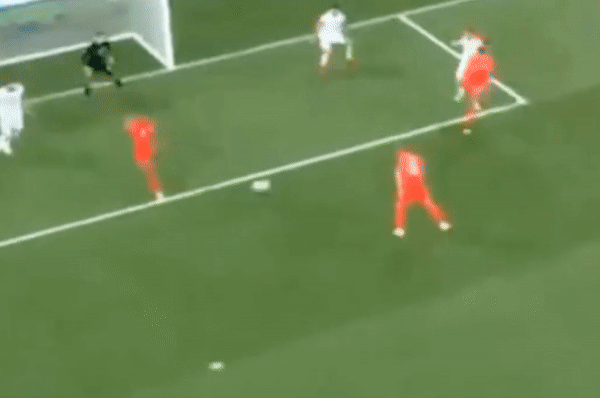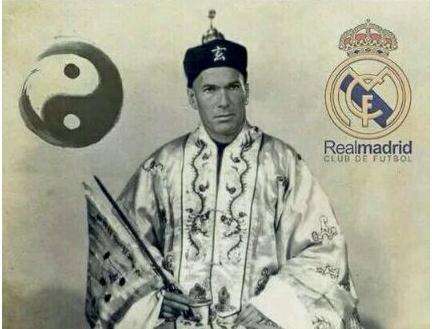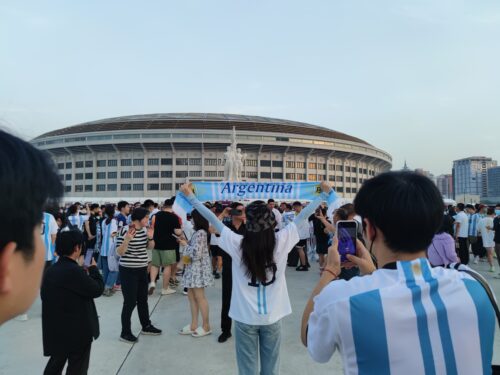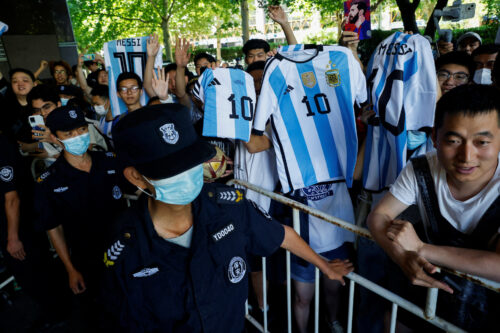Raheem Sterling ‘vomits bread’ and Ozil ‘bears the wok’: Funny Chinese soccer expressions and World Cup memes
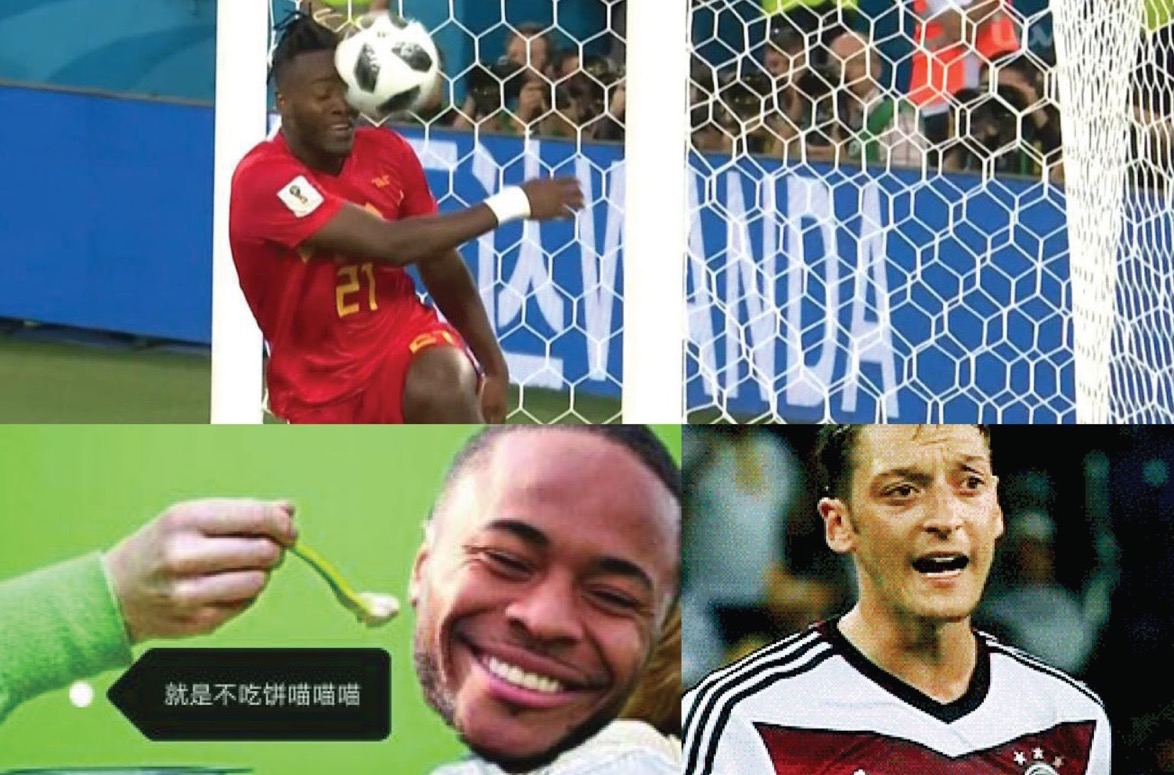
…Amusing online neologisms from Chinese soccer fans who marvel at French luck, make fun of England, and despair over gambling results.
Just never forget: Benzema is to blame.

The World Cup is over, and France are champions, having defeated Croatia 4-2 in an entertaining finals yesterday. The tournament was huge in China, drawing 790 million total domestic viewers, according to research firm China Baogao 中国报告. More tickets were sold to people from China than England, according to FIFA, and 60,000 Chinese traveled to Russia for the World Cup, according to Ctrip.
How else do we know the World Cup played well in China? Because soccer talk flooded Chinese internet over the course of the 32-day tournament, with articles written about everything from Japan’s opening-game victory to “football’s coming home” (China News even commented on Gary Lineker’s tweet in a piece headlined: “‘Three Lions’ more like ‘Three Kittens’: Is ‘football’s coming home’ mere humor?”)
And because this is the internet we’re talking about, online users exercised their creativity and invented neologisms to describe everything from French “luck” to German scapegoating of Mesut Özil. (And to mock England, of course; sorry, English fans.)
Here were some of the more frequently seen — and our favorite — soccer-related Chinese internet expressions from this recent World Cup.

快乐足球 (kuàilè zúqiú): “Happy soccer”
“Now all they need in soccer is happiness.” (他们踢球只要快乐就行了 tāmen tī qiú zhǐyào kuàilè jiùxíngle)
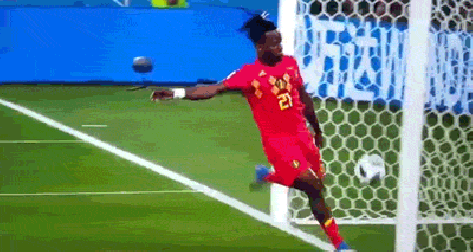
“Happy soccer” is used to describe mistakes that are so ridiculous as to be funny. We have to note that the term is basically only applied to attackers who screw up, and not boneheaded plays in general, so French goalkeeper Hugo Lloris has been spared.
England is called the “master of happy soccer” (快乐足球的掌门人 kuàilè zúqiú de zhǎng mén rén) mostly because of players like Raheem Sterling and Jesse Lingard, whose misses have drawn online cackles:
But no player can match the happiness provided by Belgian striker Michy Batshuayi, who missed four scoring chances against Tunisia and then, in the game against England, booted the ball into his own face in a goal celebration.
“I am Batshuayi, I play for the sake of happiness,” one fan wrote on the soccer news app All Football 懂球帝 (dǒng qiú dì).
Oh no what is you doing @Mbatshuayi?? 😂😂😂 pic.twitter.com/Gda4lv8eCt
— FOX Soccer (@FOXSoccer) June 28, 2018
做饼 (zuò bǐng) / 吃饼 (chī bǐng) / 吐饼 (tǔ bǐng): “Cook (flat)bread / eat bread / vomit bread”
“Mbappe is so good at eating the bing.” (姆巴佩真能吃饼 Mǔbāpèi zhēnnéng chī bǐng)

饼 (bǐng), or traditional Chinese flatbread, is used here to refer to scoring opportunities. To cook a bing means to give an assist, and to eat a bing means to turn that assist into a goal. Thus, a player like Luka Modrić is good at cooking bing, while a player like Cristiano Ronaldo is good at eating it. But someone like Raheem Sterling — not to pick on the young attacking midfielder, pictured above — always “vomits,” to use Chinese cyber-language. “Is Sterling pregnant? He’s vomiting badly,” as one joke goes (斯特林是怀孕了吗?吐得这么厉害 Sītèlín shì huáiyùnle ma? tǔ dé zhème lìhài).
上天台 (shàng tiāntái): “Go to the rooftop”
“The rooftop is really crowded tonight.” (今天晚上天台真挤 jīntiān wǎnshàng tiāntái zhēn jǐ)
Betting ran rampant during the World Cup, with Chinese police recently busting a cryptocurrency gambling ring reportedly pulling $1.5 billion in bets. What that means is: a lot of people lost a lot of money last month.
Chinese gamblers use “going to the rooftop (to jump from the building)” to describe their despair over losing a bet. When there’s an unexpected winner, like when Mexico beat Germany in their opening group game, one is liable to see countless entries of “rooftop” in the comment section underneath soccer articles.
背锅 (bēi guō): “Bear a wok (on one’s back)”
“Özil is bearing a wok for Germany’s knockout.” (厄齐尔在为德国的出局背锅 Èqíěr zài wèi déguó de chūjú bēi guō)
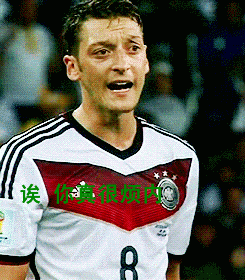
“Man, you are so annoying” (what it looks like Özil is saying, if you pretend he’s speaking Chinese)
To “bear a wok on one’s back” means to be scapegoated. During this World Cup, German midfielder Mesut Özil was fiercely blamed by German media for being unable to lead his team out of this year’s Group of Death (Group F, featuring Mexico, Sweden, and South Korea), while other German players were largely excused for their poor play. As one Chinese commenter on All Football put it, “厄齐尔替整个球队的恶劣表现背了锅” (Èqíěr tì zhěnggè qiú duì de èliè biǎoxiàn bèile guō) — “Özil bore the wok for his entire team’s putrid performance.”
全都赖本泽马 (quándōu lài Běnzémǎ): “Benzema is totally to blame”

As the joke goes, everything bad that happens in soccer can be traced back to Karim Benzema, the Real Madrid striker who was suspended from the French national team after a sex tape scandal and eventually left off this year’s World Cup squad.
Benzema’s name, in China, is basically interchangeable with “bearing a wok”: Chinese fans consider him one of the most scapegoated soccer players in the world. Because of his soft personality, inconsistent play, and that infamous scandal, Benzema has acquired a bad reputation that attracts criticism, some deserved and some perhaps not.
The phrase “Benzema is totally to blame” is used as a punchline for many soccer-related misfortunes. The jokes usually involve a long setup, such as:
Why was Spain knocked out of the World Cup so early? Because they replaced their manager three days before the tournament. Why did they replace their prior manager, Julen Lopetegui? Because he was in touch with Real Madrid during the national team’s preparation. Why did Lopetegui get in touch with Real Madrid? Because the club needed a new manager after Zinedine Zidane left. Why did Zidane leave? Because he needed a new challenge after Real Madrid won its third Champions League in a row. Why did Real Madrid win this year’s Champions League final? Because Benzema took advantage of (Liverpool goalkeeper) Loris Karius’s mistake. Therefore, Benzema is totally to blame for Spain’s knockout.
Chinese fans are split as to whether Benzema deserves the blame he receives. But he certainly bears a big wok.
玄学 (xuánxué): Dark learning
“France is relying on Xuanxue again.” (法国队又依靠玄学了 fàguó duì yòu yīkào xuánxuéle)
This word — literally “mysterious learning,” but often translated as “dark learning” and referred to as “Neo-Daoism” — originates from the 3rd century, after the fall of the Han Dynasty. But Chinese soccer fans have begun using Xuanxue to describe the profound, mysterious, and inexplicable…things that happen in soccer — in particular, lucky wins that must have supernatural forces behind them. Zidane and current Juventus manager Massimiliano Allegri are considered the masters of Xuanxue. (Didier Deschamps, France’s national team manager, might soon be joining the list.)
Danilo, the Brazilian right back, is considered a player who has mastered Xuanxue, since he seems to accumulate trophies everywhere he goes (Porto, Real Madrid, Manchester City). People joke that he has been working Daoist magic to make his teams win.
This was an expression seen during the finals: “法国队没怎么射门就进了两个球了,这都是玄学” (fàguó duì méi zěnme shèmén jiù jìnle liǎng gè qiúle, zhè dōu shì xuánxué) — “The French team has two goals despite not really shooting, this is all Xuexuan.”

What will the next World Cup bring? We don’t know, but we can only imagine what might happen if China actually qualifies. If they don’t, Benzema is totally to blame.
